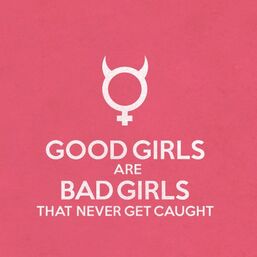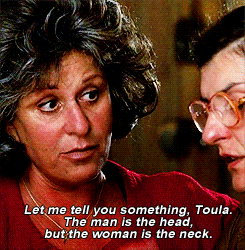 What does this even mean? I guess I have been a good girl because I have been a good person, but I know that the connotation of this phrase is much more weighted. It has the patriarchy written all over it. It is dripping with sexual undertones. It screams cultural gender norms at me. This is not a phrase I ever use with my daughter. It is a phrase I would employ in the presence of a dog and even then, I would prefer to use the dog’s name. I understand how it can be an automatic phrase used when parenting. It is a seemingly simple phrase that kids can understand. But good and bad, boy and girl, black and white are not simplistic opposites. They are very nuanced and complex terms. I am not saying that I know what would be a better alternative. In parenting I am really just trying my best but mostly making it up as I go along. All I know in regards to the phrase “good girl,” or more specifically, “be a good girl,” is that I do not use it. Usually I have written about a topic before we talk about it on the podcast. This episode was improvised. Honestly I do not remember much of what was said except that the reason I never use the “be a good girl” phrase, is because it is confusing. Be a good girl means do not do bad things. Why not just say “don’t do…” fill in the blank? I also never use this phrase because I do not want my daughter to equate actions that are seen as “bad” as descriptions of her character. The action may be bad, but she is not, therefore she does not have to be a "good girl" or be anything really. She can just be herself. In Spanish there is no phrase that is used in parenting that is the exact translation of "be a good girl." We say "portate bien," which translates to "behave well." I definitely use that phrase often, but I don't use it as a threat the way my mother would use it, engaging a stern voice and a severe gaze. Rather, I use it as a friendly reminder. Do you find yourself using the phrase "be a good girl," with your daughter? What are you really trying to say when you use this phrase? Is this something your mother said to you? Would love to hear from you! XO, Wendy
0 Comments
 It’s Safe to say Latino culture is male chauvinist oriented and generally revers the machismo persona. There are a lot of factors that come into play. Catholicism which is inherently part of being Latino, proliferates the idea of traditional gender roles as the best way. What does this mean? Women in the home and men at work. But it starts earlier than that. It starts with how we treat our kids and the differences that exist in how we treat boys versus girls. There is a juxtaposition between what culture may dictate and what is really being practiced in the home. For example, I am always reminded of a scene from my big fat Greek wedding where one of the aunts says The man is the head, but the woman is the neck, meaning the woman is the one that navigates which way the head or man is going to move. While Latin culture may adhere to the man as the ruler of the home, it is matriarchal in the sense that the mother figure, usually the grandma is the one that is the most respected in the family and often times consulted on important matters. I hope to become the matriarch in my family. I am thankful that my kids are growing up in an era when the world view is shifting on so many topics specifically those around gender. They will have a world that is much more open to them and I’m looking forward to seeing how they develop as people. They will be able to define themselves as they see fit and hopefully will not be shackled to cultural expectations around gender. In a way and because I am part of two cultures, and grew up straddling both, I grew up in a changing era but also experienced what it is like and what it feels like to be rooted in these traditional gender roles. My big generalization is that in our mother's time there was a stigma associated with not following traditional gender roles. What do gender roles mean to you? What gender stereotypes do you conform to? Which do you challenge? How will you explain gender roles and gender stereotypes to your kids? Would love to hear from you! XO, Wendy |
AuthorWendy writes blog posts that turn into conversations for the Mamá Cita Podcast. Archives
May 2021
Categories
All
|
 RSS Feed
RSS Feed
